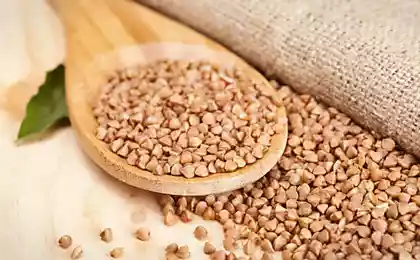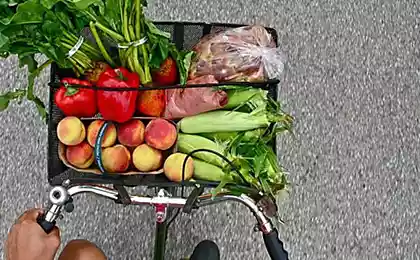200
25 Secrets of Healthy Eating

1. Have a second cup of coffee. This will help reduce the risk of diabetes in adults, according to a study published in the American Journal of Clinical Nutrition.
2. Don't put food at the table. Scientists have found that people who are served food in plates, consume 35 percent less food than those who put in their empty plate from a common dish in the middle of the table.
3. Think before you drink. The average person consumes more than 400 calories a day with drinks – twice as much as the body can process. As a result of the consumption of soft drinks, a person receives about 10 additional teaspoons of sugar each day. Swap out sugary teas and sodas for non-calorie drinks and you can shed up to 18 kilograms a year.
4. Refer to memories more often. British scientists have found that people who think about their last meal before snacking, consume 30% fewer calories than those who do not think about it. The point is that when you remember what you ate earlier, you also realize how nutritious it was. This, in turn, will help you not to abuse the evening snacks.
5. Consume protein at every meal. Dieters are advised to include more protein in their diet, as this will allow them to feel less hungry. The fact is that proteins are the best nutrients that help speed up your metabolism, reduce appetite and reduce the need for food the next meal.
6. Choose whole grain bread. Eating whole grains instead of refined ones reduces the risk of cancer and heart disease.
7. Think of the fish. Consuming 300 grams of oily fish per week will improve your mental abilities. The most suitable species for this purpose are salmon, tuna, herring, mackerel and trout. Their meat contains a lot of docosahexaenoic acid (DHA), which reduces the risk of developing Alzheimer’s disease. Study participants with high blood levels of DHA performed better on the nonverbal reasoning test and also showed higher scores of thinking flexibility, working memory and vocabulary compared to those with lower DHA levels.
8. Subscribe to the newsletter for the thinners. Canadian scientists have found that daily letters (or tweets) containing tips for weight loss remind you of the goal and help you lose weight.
9. Cut your portions by a quarter. Researchers at Pennsylvania State University found that simply reducing a serving of food by 25 percent would reduce calorie intake by 10 percent. You will not feel more hungry than usual. Do you put the food on yourself? Think about what your regular serving looks like, then put in at least a quarter less. By the way, studies have shown that in restaurants portions from 2 to 5 times more than prescribed by state regulations.
10. Turn off the TV. Scientists from the University of Massachusetts found that people who watch TV while eating, consume on average 288 more calories than those who eat with the TV turned off.
11. Put the fork aside while chewing food. Or take a sip of water between each piece. Studies by Greek scientists have shown that a slow meal accelerates the production of two hormones responsible for feeling full.
12. Use rye bread to make morning toast. Swedish scientists have found that those who eat rye bread are not as hungry for 8 hours after breakfast, unlike those who eat wheat bread. All thanks to the high fiber content and minimal effect on blood sugar levels. As a result, you are less likely to eat and less likely to eat for lunch.
13. Eat more fruits and vegetables. One study found that people who consumed 4 to 5 servings performed better on the acuity test than those who ate less than one serving. Remember, salad is not always a healthy choice.
14. Drink green tea. Chinese scientists claim that it will help you strengthen the skeleton and protect against fractures in old age. One study also found that green tea helps with bad breath.
15. Do exercises before lunch and dinner. Exercise will allow your food to be better absorbed, according to a study by British scientists. This means that you will consume fewer calories during the day.
16. Do you suffer from a hangover? Eat asparagus. When South Korean scientists exposed liver cells to asparagus extract, they found that the activity of a pair of enzymes responsible for the absorption of alcohol doubled. This means that you will begin to feel like a cucumber twice as fast as usual.
17. Sleep for 8 hours. Too much or too little time spent in dreams will add extra pounds, according to researchers from Wake Forest University.
18. Discover Japanese miso soup. Undaria cirrus, added to miso, will help lower blood pressure, especially if its level is already elevated, say scientists from the University of North Carolina.
19. Drink 2 glasses of milk a day. People who drink a lot of milk have a 16 percent lower risk of developing heart disease than those who do not consume it.
20. Add a little zinc to your diet. 15 milligrams of zinc per day (the amount contained in Centrum Ultra multivitamin, for example) will cause your cells to produce more proteins that will fight bacterial infections.
21. Act on your own, eat your favorite food. Good nutrition should not be deprivation, but a series of sensible decisions. Why eat a 1,000-calorie cheeseburger if a 500-calorie hamburger is the same? The result is simple: eat what you like, but know the measure in everything.
22. Choose food with fewer ingredients. There are over 3,000 now.
ingredients on the list of permitted food additives. And any of these preservatives, artificial sweeteners, dyes, and flour baking powders can end up on your plate. Do you know exactly what these chemicals will do to your waistline and health? Of course not. There is a simple rule: if a seven-year-old can’t pronounce the name of a product, you shouldn’t eat it.
23. Snacks and popcorn. A 2009 study found that those who ate a cup of fresh popcorn 30 minutes before breakfast consumed 105 fewer calories. Just take the one without butter.
24. Also try to snack on walnuts. Daily consumption of walnuts will increase levels of high-density lipoproteins (good cholesterol) and lower low-density lipoproteins (bad cholesterol)
25. Shake your breakfast. People who eat eggs for breakfast instead of buns consume 264 fewer calories for the rest of the day, according to a University of St. Louis study. That’s because proteins are absorbed better than carbohydrates.
Source: mixstuff.ru
Source: /users/78
























